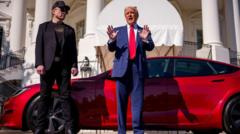Elon Musk's Tesla has issued a warning about possible adverse effects on U.S. exporters due to retaliatory actions from other countries against recent trade tariffs imposed by President Donald Trump.
Tesla Raises Alarm Over Retaliatory Effects of Trump's Tariffs

Tesla Raises Alarm Over Retaliatory Effects of Trump's Tariffs
Elon Musk's Tesla expresses concern for U.S. exporters facing risks from international trade retaliations following President Trump's tariffs.
In a recent unsigned letter to the U.S. trade representative, Tesla indicated its support for fair trade but expressed apprehension that U.S. exporters might bear the brunt of retaliatory measures. This letter coincides with an event at the White House where President Trump affirmed his support for Tesla by announcing his plans to purchase a vehicle from the company.
Tesla's stock has seen a significant decline of 40% this year. Analysts suggest that while Musk's ties to the Trump administration may be negatively impacting the brand, the primary concerns for the share drop relate to production targets and decreasing sales. Despite efforts to localize their supply chains by seeking domestic suppliers, Tesla's letter noted the continued challenges in sourcing specific parts within the U.S. market.
Trump’s recent tariffs include a 20% levy on imports from China, prompting Beijing's retaliatory tariffs on U.S. products, including electric vehicles. China plays a vital role as Tesla's second-largest market. The letter highlights how previous trade policies resulted in immediate increases in tariffs on U.S. electric vehicles by affected countries.
Other nations, including the EU and Canada, have made threats to counter these tariffs with their own trade restrictions. Amid these tensions, Tesla has faced protests in recent weeks, with demonstrators targeting its showrooms over Musk's collaboration with the Trump administration. During his recent White House event, Trump condemned such protestors, suggesting they ought to be labeled as domestic terrorists while promising to support U.S. companies like Tesla.
Tesla's concern over tariffs reflects larger trade dynamics and the challenges facing U.S. companies in the current global trade environment.
Tesla's stock has seen a significant decline of 40% this year. Analysts suggest that while Musk's ties to the Trump administration may be negatively impacting the brand, the primary concerns for the share drop relate to production targets and decreasing sales. Despite efforts to localize their supply chains by seeking domestic suppliers, Tesla's letter noted the continued challenges in sourcing specific parts within the U.S. market.
Trump’s recent tariffs include a 20% levy on imports from China, prompting Beijing's retaliatory tariffs on U.S. products, including electric vehicles. China plays a vital role as Tesla's second-largest market. The letter highlights how previous trade policies resulted in immediate increases in tariffs on U.S. electric vehicles by affected countries.
Other nations, including the EU and Canada, have made threats to counter these tariffs with their own trade restrictions. Amid these tensions, Tesla has faced protests in recent weeks, with demonstrators targeting its showrooms over Musk's collaboration with the Trump administration. During his recent White House event, Trump condemned such protestors, suggesting they ought to be labeled as domestic terrorists while promising to support U.S. companies like Tesla.
Tesla's concern over tariffs reflects larger trade dynamics and the challenges facing U.S. companies in the current global trade environment.






















